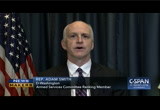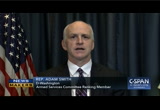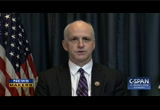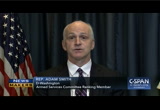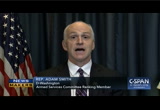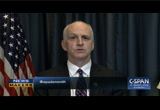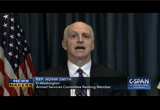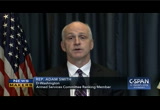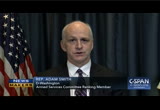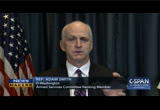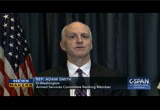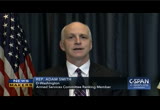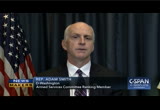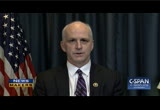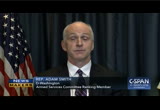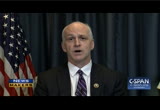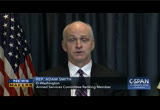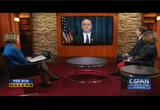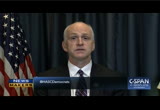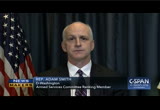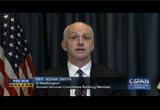tv Newsmakers Rep Adam Smith CSPAN December 4, 2017 1:19pm-1:51pm EST
1:19 pm
referendum and then when they gave us a different opinion say do it a different way they did it a different way. this is the fear of every government, that we will be at the mercy of the federal government and they'll make us pay for it. it's not right. and i believe here it's very clear that the federal government overstepped its bounds and violated the 10th amendment. that's why i think you saw so many governors joined us. today is sports gaming. tomorrow will be something else. new jersey wanted to appropriately regulate sports gaming. [no audio] >> wednesday morning we're live in tallahassee, florida, for the next stop on the c-span bus 50 capitals tour. florida state representative and speaker of the house richard will be our guest on the bus during "washington journal" starting at 9:45 a.m. eastern.
1:20 pm
>> our guest is congressman adam smith of washington state, the ranking democrat on the house armed services committee, a member of congress since 1996. thank you for being with us. >> thank you for having me on. >> let me introduce the reporters who will be asking questions. we want to start our conversation with the developing situation with north korea that, there are reports from multiple national news sources the white house is set o make a long rumored move with secretary of state tillerson, replacing him with mr. pompeo from the cia, and replacing mr. pompeo with senator tom cotton.
1:21 pm
this is part of the administration's foreign and national security team and i'm wondering if you have a reaction to those names in those particular places? rep. smith: i don't know that it changes anything. my biggest concern in that grouping is the state department. that, whether it's secretary tillerson or secretary pompeo, the state department has not been engaged. diplomacy has fallen off significantly. morale at the state department is terrible. they are -- i think they have like a third less people there. there just doesn't seem to be a diplomatic focus. and diplomacy is sort of governed by want president's tweets. the secretary of state is forced to react. whatever the change is, however they do it, i hope they start using diplomacy as a key tool in our agenda. because right now i am very concerned what's happening at the state department. host: do you think that's an administration cultural issue, drawing down the numbers of people at the state department and that it would change with someone else at the helm?
1:22 pm
rep. smith: i doubt it would change. i do think it's a cultural issue. i think it reflects president desire to of employ the state department. whether it is because he wants to control the messaging or he doesn't believe in it. they got rid of a working group at the state department. a critical piece moving forward to achieving some peaceful solution, some stable solution in afghanistan and pakistan. they have completely disbanded it. we have made no progress in the middle east. there has been little progress in terms of building relationships in africa. i don't think they understand diplomacy. i don't -- i've served with congressman pompeo. 'm not sure he's a significant upgrade. at least tillerson was very global. i am not optimistic the state department is going to get better under secretary pompeo.
1:23 pm
host: well, onto one of the major issues and that's north korea. you have a question. >> thank you for being with us. on north korea, i would be interested in getting the reaction to the latest missile test. you did mention diplomacy. obviously that has been the route so far. how concerned are you about his latest missile test, how concerned are you an attack might be imminent? rep. smith: i'm not concerned at all an attack is imminent. i don't believe that is north korea's intent or vision. kim jong-un has made it clear that north korea believes they need to develop a robust missile and nuclear weapons program for regime survival. completely wrong about this, but the north koreans believe they are going to be invaded at any moment. they have a paranoia about the united states that's impossible to overstate. they think they have to be armed and ready.
1:24 pm
i don't think it's their plan to attack us in part because they think it's suicide. certainly they could inflict damage on our country but we could completely eliminate ours working with our allies south korea and japan. i don't think the attack on the u.s. is imminent. i think they're continuing to develop their missile program. my concern is we stumble into a war that we shouldn't stumble into. what we have to make clear to north korea is that we have a credible deterrent. that they attack us or south korea or japan or any of our allies, we have the force to completely destroy them. therefore they will not engage militarily in that way. that is my biggest concern. we stumble into a conflict that -- thinking that north korea's going to do something. they think we're going to do something. they act. diplomacy continues to be important. i am mindful of the limitations. what i hope is what we diplomatically convey is the deterrence.
1:25 pm
is that we will defend our allies. we will defend our interests. we wish we could stop them from developing the missiles and the nuclear technology that they have. nothing at this point has worked. we'll continue to sanction them. as well we should. continue to isolate them from the rest of the world. the real red line is they attack us, any of our interests or any of our allies. >> how well do you think the u.s. is communicating those issues? you just said you don't have a lot of confidence in approximate their diplomatic strategy right now. you have introduced legislation to try and put limits on the first strike by the u.s. if you are not concerned about the north koreans attacking the u.s., what is your concerned with that stumbling forward as you said? rep. smith: i would not go so far as to say i'm not concerned with north korea attacking us. they are unpredictable. instamble. who knows how they -- instable.
1:26 pm
who knows how they might miscalculate. i don't believe it is their intent. i don't believe they are building these nuclear weapons because they plan on attacking us. i don't think it's their intent. it does not mean they might not say we think the u.s. is going to attack us, or south korea is going to attack us. so we better do it first. that's my real concern is that you assume the other side is going to hit so you say we may as well go first. as far as the president's approach, i mean, thus far working with secretary tillerson and secretary mattis i think they have communicated that message. that you better not mess with us because we will respond in a way that you can't handle. i think delivering that message s important. i worry about whether there are people in the trump administration who think we have to do a preemptive strike. such a strike would in all likelihood set off a catastrophic war at a minimum on the korean peninsula. japan would be in danger, potentially with their allistic missile capability,
1:27 pm
the united states might be in danger. the trump administration, despite rhetoric, has been willing to hold their fire. i hope that continues. leo: let me give one follow-up here. since we are in d.c. we talk not in the abstract but from a foreign policy aspect, you are the ranking member of the house armed services, there are tens of thousands of military families and troops stationed in south korea and japan. what would you tell them now as they see these developments and as they see these very concerning tests, this back and forth with the trump administration and the north korean regime? rep. smith: it is difficult. look, i am not going to tell them there is nothing to worry about. obviously you have for growing and somewhat unpredictable power in north korea facing off against the united states, with increasingly heated rhetoric. there is cause for concern.
1:28 pm
i would tell them it is my hope and my belief that the united states will not engage in a precipitous war that we do not need to participate in. we can contain north korea without having to use a military strike, a military strike that would probably set off a chain reaction that would lead to war and destruction on the korean peninsula and elsewhere. i'll give you the same answer that i have already given. we have to present a credible deterrent to make sure north korea does not use weapons they are developing. roxana: is there anything congress can do in this respect to aid the diplomatic effort and to try and deter a preemptive strike, or is congress -- do you find that emboldened ort of and there are certain lawmakers who would rather, you know, see a strike on north korea? rep. smith: by and large most
1:29 pm
members of congress do not want to see a war started on the korean peninsula. what we can do, we can use the right rhetoric. strong, credible rhetoric that we will just heard north korea and downplay preemptive or preventative action. it's rhetorically. that is not just about north korea. that is no first use, period. one of the things i am concerned about aside from north korean is the lack of dialogue between nuclear powers, even during the height of the cold war we had back channel communications with the soviet union to try to avoid stumbling into a nuclear confrontation. right now that level of dialogue with russia and china in addition to north korea does not seem to be there so i think we need to make sure, you know, we don't stumble into a nuclear conflict there as well. i see no justification whatsoever for the use of
1:30 pm
nuclear weapons. we need nuclear weapons as a deterrent because russia, china, those countries have those weapons. first use does not make sense, and i think it can calm the fears of a lot of countries that the u.s. policy is not to use weapons first. i know we believe we would never do that, but north korea, for instance, certainly, but russia, a lot of people there don't have the same trust in the u.s. that we do and that sort of miscalculation and paranoia about your adversaries could lead us stumbling into a war, stumbling into a nuclear war. host: what's the prospect for your resolution? mr. smith: in the republican congress i don't see them moving it, but i want to begin that dialogue. there is a lot of pieces of legislation that start off thinking what is the chance? you don't know until you try. you have to begin the process. passing legislation usually is an effort in patience and persistence. i want to start that debate and move us in that direction.
1:31 pm
leo: congressman, i want to shift to the budget. we had quite a few fights on capitol hill over the republican tax reform package and we are just a few days away from the continuing resolution running out. i'm wondering what your concern level is with the chance of a partial government shutdown? mr. smith: it's high. very high. we have made no progress in this debate and we continue to fire shots back and forth without addressing the real issue. and the real issue is, you know, it's sort of two levels. one is the budget caps. i mean certainly the budget caps are problematic. the defense industry in particular, there are many who believe defense needs more money than the $549 billion contemplated in the budget control act, and there are many -- myself included -- who believe nondefense discretionary is also capped at too low a number. how do you get an agreement with enough republicans and democrats to get 60 votes in
1:32 pm
the senate to exceed those budget cap numbers and the larger issue is, we're $20 trillion in debt and running up a deficit of $700 billion a year. just getting rid of the budget caps doesn't change that math. ok, maybe we survive a year or two. what about five years from now, what about 10 years from now? if you want to simply focus on my committee's concerns, the armed services committee's concerns, there is lots of angst that our current military is underfunded. we can have that debate but if you believe that, if you do a massive tax cut, what's it going to be like five years, 10 years from now? if we don't figure out a strategy for our overall budget that's sustainable, even if we survive this year, at some point we are not going to have the resources necessary to maintain the national security we would like to. and there's a lot of different answers to that but i can tell you cutting taxes by a companyle trillion dollars makes it worse -- by a couple trillion dollars makes it worse, not better.
1:33 pm
roxana: congressman, there's lots of doing another stopgap measure, another continuing resolution through january. is that something you would support or is it something that the democratic caucus would support or would it be basically those lack of votes that could lead to a shutdown? mr. smith: i'm not sure. it's something we would be reluctant to support because we don't need a continuing resolution. we need appropriations bills. whatever the number is we need to set that number. because governing on a continuing resolution, particularly at the defense department, is difficult and, you know, it makes it much, much harder to implement any sort of sustainable national security policy. when you say you have to live with last year's number and you have to live with no new programs and you can't get rid of old programs, it's a terrible way to govern. and things aren't going to be any better in january than now. we need to sit down together in a bipartisan way and reach an appropriations deal. that was true in january of
1:34 pm
this year when president trump was sworn in, and it's still true today and it's just -- it really, really is concerning that we haven't made any progress on that in 10 months. host: we have 10 minutes to go. leo: this is an issue that we talked about many times in the past. it's not just during the trump administration but going back several years with the sequestration, with the budget caps. in your opinion, what is it going to take to make real headway on these issues? what's going to be the breakthrough moment where republicans and democrats on the hill can come together and, you know, talk about -- talk about tax cuts, tax increases, which programs should be preserved? it feels like we are in the same cycle every year, every few months. mr. smith: going back to 2010. no. there's no short-term simple solution. what it's going to take is an honest discussion with the american people about the budget choices that we face. for too long we've had politicians that have -- looked at polls and they see that the public wants a balanced budget.
1:35 pm
they support a balanced budget concept. the public is also very concerned. they don't want to see their taxes increased and they don't want to see popular programs cut. well, that math doesn't yaupped. in campaign after campaign all across this country you have politicians promising exactly that. well, i want to be fiscally responsible. i want to get to balanced budget. no, i won't raise your taxes. no, i won't cut this program. no, i won't cut that program. no, i won't cut the other program. the math does not add up. so it starts with an honest conversation, because the problem is right now, the public wants a balanced budget without raising taxes or cutting spending. that's impossible to deliver. now, they want that, like i said, because too many candidates for congress have promised it. too many members of congress have promised it. what that means is any appropriations bill that we would pass would be politically unpopular because it wouldn't balance the budget without raising taxes or cutting
1:36 pm
spending. and that is why, whatever the majority, whether the democrats in the majority, house, senate, they're all reluctant to say here's my appropriations bill because whatever that appropriations bill is, it's going to fail probably on all three of those areas. it's certainly not going to balance the budget. if it raises taxes, it will be unpopular. if it cuts spending anywhere it will be unpopular. so until we get to the point where we can have an honest conversation with the american people about the budget choices we face, we will be trapped in this gridlock. roxana: in more immediate terms, republicans and democrats are at a stalemate. there was progress made at the staff level on budget talks, and lifting caps but those fell through. democrats have certain requests and requirements, including immigration, that should be included in any omnibus spending bill or any budget
1:37 pm
deal. republicans want to increase defense a lot more than they would for domestic spending. where'd do you see this going? it's a stalemate. december 8 is when government spending runs out. if there's not another stopgap bill. how do you see the both parties coming together to do the right thing, as you say, and have that honest conversation when time is running so short? mr. smith: i want to make sure you understand my answer clearly. first is what i think should happen, what i would like to see happen. i think we should come together on an agreement to get rid of the budget control act. it has not worked to control spending. and it has not worked to give us a reasonable budget framework. we should repeal the budget control act, reach an agreement on what to do about defense and nondefense discretionary spending, and we should look at revenue and we should look at
1:38 pm
the broader budget, including all mandatory programs, and put together a budget that gives us a pathway towards a sustainable budget. now, that's what ought to happen. it's not what's happening. the republican tax cut alone is just -- it just kills any of that debate. how can you be talking about reducing revenue to the federal government and, no, i don't believe that cutting taxes increases revenue for the very simple reason it doesn't. historically you can look at the numbers and you can see clearly it doesn't. i had the easiest job in the world if cutting taxes increased revenue. the ideal tax rate would be zero and obviously that doesn't pencil out. now, if the tax rates get too high -- and there was a time where we had a 90% top rate. we had a capital gains rate 66%. the top tax rate is 39%. capital gains rate is 20%. 15% for a long -- for longer
1:39 pm
held stock. at that level you're simply not going to change the dynamic that much by cutting taxes. so we got to have an honest conversation. that's what should happen. what's likely to happen given all the problems i just outlined, what's likely to happen is we stumble through one short-term c.r. after the other which is a terrible way to run the government. and we keep moving forward and don't pass appropriations bills for 2018. again, i think that would be a colossal failure and it would be a huge problem for our government functioning properly. given the rhetoric, given what we saw out of president trump before negotiations started which said i am not going to do anything the democrats want. they don't deal. he said, i don't see a deal before they even started talking, i don't see how we get there. i think it is going to be bad for the country next week terms -- in terms of how we handle
1:40 pm
the budget. roxana: are you worried democrats will get blamed for it and also in 2018? rep. smith: my focus is not on who gets the partisan blame. my focus is on governing the government properly. i think the democratic party will benefit if we present an intelligent approach to governing. i do think that we should try and talk with the republicans. but i don't blame leader pelosi or senator schumer at all for not wanting to show up to a negotiating session where before the negotiating session the president says, you guys are awful, terrible, what you want is not even anything we can talk about. you know, at some point you got to say, that's not a negotiation. we are not negotiating with a credible partner. and i hope that the president and the republican party will change their rhetoric and say we know we have to work together on this. let's not prejudge anything. let's sit down and talk and see where we wind up.
1:41 pm
that's what needs to happen for the negotiations to start. so, look, i am, you know, focused on the good of the country. the partisan blame piece i'll leave to others. leo: before we let you go i do want to bring up u.s. military operations in africa. we heard about some unsettling reports in the last weekend week. pentagon pushed back on the operations in somalia had civilian casualties. even intentional civilian casualties. what's the committee's role looking forward on that and what's your concern level with sort of the lack of public awareness on these military operations in africa? mr. smith: well, our role is oversight. our role is to make sure we less civilian casualties as possible and take responsibility for them when they do happen. you do have to be aware, however, that our enemies -- and we do clearly have enemies, and isis and al qaeda and a number of other groups, they will constantly claim civilian casualties. they will sometimes create
1:42 pm
civilian casualties and then blame them on us. so we have to fight back against that rhetorically and make sure the record is clear and accurate. hat said, i am concerned about the increased bombing under the trump administration and whether or not there's sufficiently accountability. independent agencies, not groups that oppose us, but independent agencies have said that the number of civilian casualties as a result of u.s. attacks in the last year have gone up significantly. i think we need to address that. the individual case in somalia, our military says these were enemy combatants that were taken out. i take them at their word because we have in the past admitted when we inadvertently hit civilian targets. about whether it was intentional, i don't think there was any evidence, the u.s., as a matter of policy, targeted civilians. we don't do that. we never do that.
1:43 pm
now, what does happen is in the bombings, civilians are caught in the cross fire and we must work as hard as possible to prevent that. it's inhumane for one thing. it only adds fuel to the fire of terrorist groups that want to attack us. it makes it easier for them to recruit. i think the role of the house armed services committee is to conduct oversight, to make sure when civilian casualties happen, and to take steps to minimize it. host: we have one minute. final question from either of you? leo: just -- and i do want to clarify the reports said local forces may have been targeting folks, not u.s. forces. just to go back on that. the level of aggression you're seeing there, is that a reflection of trump, is that a reflection of the military? where do you -- where are your concerns coming from? mr. smith: i think that's a reflection of trump and the military. there was a widely held feeling
1:44 pm
in the military that the obama administration was too cautious, that they hezztailted on a number of a-- hesitated on a number of attacks when they should have gone forward. i think president trump wanting to do the opposite of whatever president obama has done has sort of said you are more free to attack when you think you should. i think civilian oversight is critical in a number of these missions to make sure we are attacking at appropriate time and the appropriate place. it does reflect a change in approach, president trump was to be more aggressive about attacking the enemy. look, just be clear. there are terrorist groups that threaten us. i don't have any problem whatsoever with hitting those groups before they hit us. but there's a huge cost to doing so in too indiscriminant a matter, when you start having civilian casualties and turning populations against us instead of terrorist groups. host: well, that's it for our time. thank you so much for being our
1:45 pm
guest on "newsmakers," congressman adam smith, the lead democrat on the house armed services group. mr. smith: thank you. host: let's look at the week ahead. what does capitol hill look like in the coming week for both of you? leo: right now is the question of shutdown hanging over everything. we are getting out of the tax debate. where is that going to go? what a compromised measure will look like. in terms of another cr, a long-term deal, you heard from the congressman, there's just total uncertainty on capitol hill. host: does either side really want a shutdown? roxana: i don't think so. i don't think they do. as you heard congressman smith just now, it seems like it could be likely just because the two sides just are not close enough to, you know, to
1:46 pm
agree on even a short-term stopgap measure. leo: i feel like in the past when we've gotten to this point there were rumors of deals, at least some progress forward. but we really have not heard much of anything. as frustrated as the congressman and other lawmakers are about the inability to repeal these budget caps, there is at least rumors of a two-year plan. rumors of some sort of short-term deal. this time, despite having three months since the fiscal year with the c.r., it really is where we were back in september. roxana: and there were some discussions obviously at the staff level. there was some sort of tentative plan to increase defense spending i think by $54 billion. to $603 billion. but the democrats were not happy with the offer on the domestic side and that was well before everything implode between president trump and
1:47 pm
nancy pelosi and chuck schumer that was before they, you know, cancelled on the white house meeting, they walked out of the white house meeting. and now when you regularly ask the lawmakers who would be involved in the talks, no, it's still at the staff level. they don't have any -- any new details. so it's pretty clear it's stagnant. it's not going anywhere. so the republicans might need democratic votes to even pass a stopgap measure. if the democrats decide not to vote for one, they might -- they might have a very tight vote because you have armed services committee members who also don't want to see another continuing resolution. the math gets tied. host: the congressman made reference to the immigration issue. that's the fate of the so-called dreamers, the young people who came to this country at an early age and the democrats have argued they should have a pathway to
1:48 pm
citizenship. how important ultimately is this for the democrats or the numbers that you're talking mrs. mcmorris rodgers: important and is this a good bargaining chip? leo: it's hard to say. this is a major issue. if the issue is not addressed they will not back in the short-term deal. i don't think it is a bargaining chip. to the larger point, even if they found a two-week c.r. and we push it back to christmas or january, i don't know there's any progress on issues like this, on these fundamental disagreements between the two parties. two more weeks may be prolonging a shutdown or another month may be prolonging it. i don't know there is a clear path ahead to immigration, on these domestic or defense spending issues, anything at the heart of the budget fights. host: our last minute we should spend on north korea. what do you think of the congressman's assessment of the situation? roxana: it's very concerning but it was good to get his
1:49 pm
assessment in terms of him not expecting any imminent attack on the united states or u.s. interests. but i think we're getting to a point where everything really hangs in the balance. like he said, there could be a misstep at some point both on north korea's side or the united states' side. i think there's a lot of reason for concern. in the united states and in congress. leo: on the danger of misstep, while we are seeing the state department in upheaval and what new dynamic does that add if there is a new secretary of state, if there's new leadership in the cabinet, does it -- does it -- it's hard to imagine that's going to calm things, to have new players suddenly end entering the field -- suddenly entering the field. roxana: secretary jim mattis
1:50 pm
has definitely stressed a diplomatic solution. you don't see any saber rattling just yet on the military side. they are cautious. they are definitely supporting the diplomatic talks side of the issue. host: well, thanks to both of you for being our questioners this week on "newsmakers." we appreciate your time and your expertise. leo: thank you. roxana: thank you for having me. >> and president trump is visiting utah today to announce his decision to reduce the size of two national monuments in that state. bears ears national monument created by former president escalante scalane -- national monument by bill clinton. democratic leaders in congress announced today they are heading to the white house this coming thursday to meet on federal spending. senator chuck schumer and representative nancy pelosi declined a meeting last
43 Views
IN COLLECTIONS
CSPAN Television Archive
Television Archive  Television Archive News Search Service
Television Archive News Search Service 
Uploaded by TV Archive on

 Live Music Archive
Live Music Archive Librivox Free Audio
Librivox Free Audio Metropolitan Museum
Metropolitan Museum Cleveland Museum of Art
Cleveland Museum of Art Internet Arcade
Internet Arcade Console Living Room
Console Living Room Books to Borrow
Books to Borrow Open Library
Open Library TV News
TV News Understanding 9/11
Understanding 9/11

